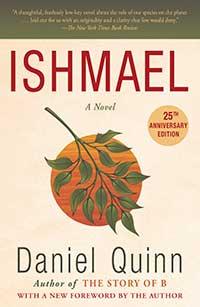Ecocentricity Blog: Leavers and Takers

Ecocentricity Blog: Leavers and Takers
When I tell the Ray Anderson story, it invariably includes a mention of a book. For Ray, it was the book, his spear in the chest that convicted him as a plunderer of the Earth. If you are reading this particular blog, you likely know the name of that book. It was Paul Hawken’s The Ecology of Commerce.
That book was far from the first that Ray devoured in his life, and it certainly wasn’t the last. The man was a voracious reader his entire life, so The Ecology of Commerce was an inflection point. From that point on, Ray read anything and everything that could help him understand how Interface could climb Mt. Sustainability. Not long after, this new-found interest in environmental sustainability led him to another important book – Daniel Quinn’s Ishmael.
In my opinion, Ishmael has one of the most compelling openings of any novel I have read. While the first sentence isn’t particularly noteworthy, the eighth, ninth and tenth ones are:
“TEACHER seeks pupil. Must have an earnest desire to save the world. Apply in person.”
In the 250 pages that follow, Quinn weaves a story that invites a deep, thorough reflection on the state of humanity. If you read this book, and I hope that you will, be prepared to think hard. Aren’t those the best books?
In his narrative, Quinn draws a distinction between two very general human cultural traditions, which he calls the Leavers and the Takers. The Leavers are essentially the indigenous humans of our planet, who now make up a tiny percentage of the global human population, but who once, many thousands of years ago, comprised all of humanity. The Takers are those who belong in some way, shape or form to modern civilization (you and me included), with our origins primarily rooted in the agricultural revolution that occurred roughly 12,000 years ago.
I hesitate to share what I consider the most important paragraph in the novel, because it sits atop a carefully constructed logical foundation in the preceding pages. Without the perspective granted by building the foundation (i.e. reading the book), much of the meaning will be lost. It’s the difference between a campfire on the beach and a lighthouse’s beacon guiding ships in from the rough seas. My compromise is that I’ll urge you, once again, to please read the book!
From page 239, with emphasis in the original – “‘Yes, okay. The premise of the Taker story is the world belongs to man.’ I thought for a couple of minutes, then I laughed. ‘It’s almost too neat. The premise of the Leaver story is man belongs to the world.’”
We have much to learn from the indigenous people of our world. They know, almost instinctively, how to live in harmony with Earth. To the contrary, our “civilized” culture has sought to control the Earth, and in doing so, introduced stresses to life on our planet. Our ever-expanding reach for arable land has disrupted ecosystems, our industrial systems have generated toxic and pervasive waste streams, and our thirst for energy is disrupting our climate.
I do not wish to castigate our civilization. So much good has come out of the last 12,000 years of human innovation. But I do think that Quinn has it right. Great peril comes to humanity if it continues to believe the world belongs to it. We can be just as brilliant and remarkable as a species while still embracing the Truth that the ancient people of Earth have to teach us – that humanity does indeed belong to the world.
Subscribe to John Lanier's Ecocentricity Blog and receive it every Wednesday via email. Click here to subscribe.
